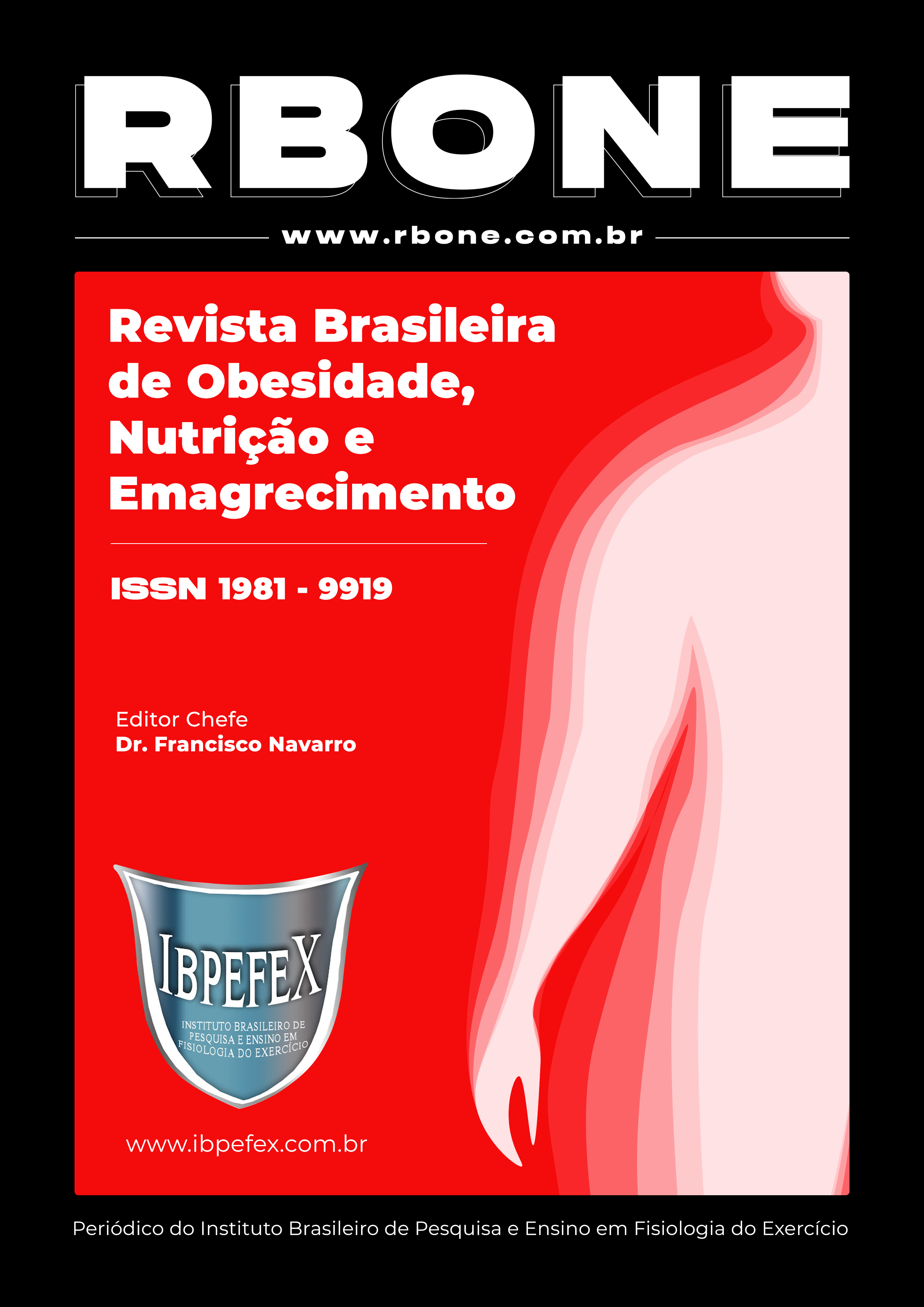Cross-cultural adaptation of the cooking skills instrument for obese elderly people
Abstract
The search for multidisciplinary interventions in the management of obesity in the elderly population has increased in recent years. In this scenario, the act of cooking has been presented as a feasible strategy. Given the above, the objective of the present study is to make available to Brazil an adapted version of the Cooking Skills instrument, in order to instrumentalize research in the area of culinary skills. This is a methodological research of translation and cross-cultural adaptation of the instrument for the elderly population with obesity. The adaptation stage followed the methodological model of Beaton and collaborators, namely: translation, translation synthesis, back-translation, expert committee and pre-test. The semantic, idiomatic, cultural and conceptual equivalences of the instruments were analyzed, obtaining a cut-off point equal to or greater than 80% of consensus among the expert committee. The pre-test stage was performed with the application of the instrument for the elderly population with obesity. Individuals aged between 60 and 75 years and with a BMI between ≥ 30 kg/m2 and ≤ 34.9 kg/m2 were invited, through an online invitation open to the community. The application of the questionnaires took place from March to May 2022 in Curitiba, Paraná and had a sample of 32 individuals. No respondent reported intercurrences while completing the instrument. During the adaptation stage, no item had to be excluded and the original instruments were preserved. The questionnaire reached the cutoff point for the cited equivalences.
References
-Astbury, C.; Penney, T.; Adams, J. Home-prepared food, dietary quality and socio-demographic factors: a cross-sectional analysis of the UK National Diet and nutrition survey. Int J Behav Nutr Phys Act. Vol. 16. Num. 82. 2019.
-Beaton, D.; e colaboradores. Guidelines for the process of cross-cultural adaptation of self-report measures. Spine (Phila Pa 1976). Vol. 25. Num. 24. 2000. p.3186-91.
-Brasil. Ministério da Saúde. Secretaria de Atenção à Saúde. Coordenação-Geral da Política de Alimentação e Nutrição. Guia Alimentar Para a População Brasileira. Versão para consulta pública. Brasília. Ministério da Saúde. 2014.
-Casas-Anguita, J.; e colaboradores. Measurements of quality of life related with health. Basic concepts and cultural adaptation. Medicina Clínica. Spain. Vol. 116. Num. 20. 2001. p. 789-796.
-Chaimowicz, F. Epidemiologia e o envelhecimento no Brasil. In: Freitas, E.V.; e colaboradores. Tratado de geriatria e gerontologia. 2ª edição. Rio de Janeiro. Guanabara. Koogan. 2006. p.106-130.
-Duarte, V. N.; Piffer, M. Caracterização do método delphi: aspectos teóricos e metodológicos. In: II Simpósio Latino-Americano de Estudos de Desenvolvimento Regional. Vol. 2. Num.1. 2021.
-Jomori, M. M. e colaboradores. The concept of cooking skills: A review with contributions to the scientific debate. Revista De Nutrição. Vol. 31. Num. 1. 2018. p.119-135.
-Júnior, C. J.; Costa, P. J. M. S. Adaptação transcultural e validação para o Português (Brasil) do Parent Attitudes About Childhood Vaccine (PACV). Ciência & Saúde Coletiva. Vol. 27. Num. 5. 2022. p.2057-2070.
-Karpinski, C.; Xavier, M. O.; Gomes, A. P.; Bielemann, R. M. Adequação da frequência e tipos de refeições realizadas por idosos comunitários do sul do Brasil. Ciênc saúde coletiva. Vol. 26. Num. 8. 2021. p. 3161-73.
-Koster, E.P.; Mojet, J. From mood to food and from food to mood: A psychological perspective on the measurement of food-related emotions in consumer research. Food Research International. Vol. 76. 2015. p. 180-191.
-Machado, R. S.; e colaboradores. Métodos de adaptação transcultural de instrumentos na área da enfermagem. Rev Gaúcha Enferm. Vol. 39. 2018. p. 1-11.
-Maia, R. S.; e colaboradores. Adaptação transcultural de instrumentos para idosos no brasil: revisão integrativa da literatura. Estud. Interdisciplinar do Envelhecimento. Vol. 19. Num. 2. 2014. p. 359-376.
-Mazzonetto, A. C.; Dean, M.; Fiates, G. M. R. Percepções de indivíduos sobre o ato de cozinhar no ambiente doméstico: revisão integrativa de estudos qualitativos. Ciência & Saúde Coletiva. Vol.25. Num.11. 2020. p. 4559-4571.
-Monteiro, D. R.; Almeida, M. A.; Kruse, M. H. L. Tradução e adaptação transcultural do instrumento Edmonton Symptom Assessment System para uso em cuidados paliativos. Revista Gaúcha de Enfermagem. Vol. 34. Num. 2. 2013. p.163-171.
-Oliveira, F.; e colaboradores. Aspectos Teóricos e Metodológicos para Adaptação Cutural e Validação de Instrumentos na Enfermagem. Texto & Contexto. Enfermagem. Vol. 27. Num. 2. 2018.
-Oliveira, M. F. B.; Castro, I. R. R. Cooking autonomy: a multilevel conceptual model on healthy home cooking. Cad Saúde Pública. Vol. 38. Num. 4. 2022. p.1-16.
-Pollan, M. Cozinhar: uma história natural da transformação. Rio de Janeiro. Intrínseca. 2014. p. 448.
-Reichenheim, M.; Moraes, C. Operacionalização de adaptação transcultural de instrumentos de aferição usados em epidemiologia. Rev Saúde Pública. Vol. 41. Num. 4. 2007. p. 665-73.
-Silva, C. T.; e colaboradores. Estratégias de enfrentamento e autoeficácia em mulheres com sobrepeso e obesidade em tratamento nutricional. Psicogente. Vol.23. Num. 43. 2020.
Copyright (c) 2024 Ana Paula Garcia Fernandes dos Santos, Giane Bientinez Sprada, Regina Maria Vilela

This work is licensed under a Creative Commons Attribution-NonCommercial 4.0 International License.
Authors who publish in this journal agree to the following terms:
- Authors retain the copyright and grant the journal the right of first publication, with work simultaneously licensed under the Creative Commons Attribution License BY-NC which allows the sharing of the work with acknowledgment of the authorship of the work and initial publication in this journal.
- Authors are authorized to enter into additional contracts separately for non-exclusive distribution of the version of the work published in this journal (eg, publishing in institutional repository or book chapter), with acknowledgment of authorship and initial publication in this journal.
- Authors are allowed and encouraged to post and distribute their work online (eg, in institutional repositories or on their personal page) at any point before or during the editorial process, as this can bring about productive change as well as increase impact and impact. citation of published work (See The Effect of Free Access).






